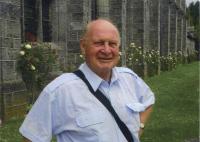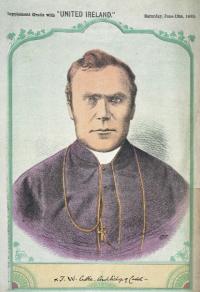‘A happy monk’ Mark Tierney OSB: an appreciation by Felix Larkin
Published in
20th-century / Contemporary History,
Issue 2(March/April 2012),
News,
Volume 20

Mark Tierney—his preparation and publication of the calendar of the papers of Archbishop Croke (above) was pioneering work. (Philip Tierney OSB; National Library of Ireland)
Dom Mark Tierney, who died in Belgium on 31 December 2011, was a notable liturgist and historian. A monk of Glenstal Abbey, he was born in Dublin in 1925 and educated at CUS in Leeson Street and at University College Dublin. His maternal grandfather was Alfred Blanche, French consul-general in Dublin in the 1920s. He joined the Benedictines at Glenstal in 1945 and taught history in the school there for many years. Mark was his name in religion; he had been christened Gerald.In the 1960s, the monks at Glenstal were in the vanguard in Ireland in accepting the liturgical reforms of the Second Vatican Council. Tierney produced two books at that time, Holy Week: a commentary and The Council and the Mass, which explained some of the changes and so facilitated their implementation. His greatest influence, however, was as a historian. His school textbooks, The birth of modern Ireland (1969, co-authored with Margaret Mac Curtain) and Modern Ireland, 1850–1950 (1972), were used by a generation or more of Irish children. They underpinned a long-overdue modernisation of the history curriculum. Incorporating the fruits of decades of scholarly research in the universities, these books helped to shift popular understanding of our history out of the realm of myth and patriotic oversimplification, fostering a more mature sense of pride in our past. As Tierney pointed out in his preface to Modern Ireland:
‘We must . . . beware of mistaking legend for truth. Modern heroes lend themselves as easily as any other heroes to myth and legend. Ireland has had its share of both.’
Reflecting, perhaps, his part-French ancestry, he also emphasised the need to relate events in Irish history to what was happening at the same time in Europe and the wider world.Tierney made a significant contribution himself to historical research. His preparation and publication of the calendar of the papers of Archbishop Croke was pioneering work. No comparable public or church records referring to relatively recent times had been made accessible in this way before in Ireland. It was done with the full support of the late Archbishop Morris of Cashel, whose far-sighted and enlightened attitude contrasts strongly with the niggardly approach of his successor, Archbishop Clifford, in regard to diocesan parish records held in the National Library of Ireland.

Archbishop Croke
Tierney crowned his work on the Croke papers with a biography of Croke, published in 1976 to much acclaim. It is the definitive portrait of this important churchman, a staunch supporter of the Home Rule and land reform movements and of the GAA. Thoroughly researched and written in an engaging style, it displays a fine appreciation of the often very worldly ambitions of eminent clerics.More recently, Tierney had focused on the life of Columba Marmion, an Irish priest who in 1909 became abbot of the Benedictine monastery of Maredsous in Belgium. He was vice-postulator for the cause of canonisation of Abbot Marmion, and was present in Rome when Pope John Paul II beatified Marmion in 2000. He published a biography of Marmion in 1994, and a shorter, popular version of it in 2000.Tierney wrote of Abbot Marmion that ‘he was at all times a happy monk’, and the same can be said about Mark Tierney. He was a larger-than-life figure, a gregarious man and an indefatigable conversationalist. He was a most generous scholar, always happy to share his research and his insights. He loved travel, and his work took him all over the world. He had an exceptional talent for friendship, and his many friends, far and near, will greatly miss his lively company—as will his confrères in Glenstal Abbey. HI
Felix Larkin is a freelance historian and writer.


















